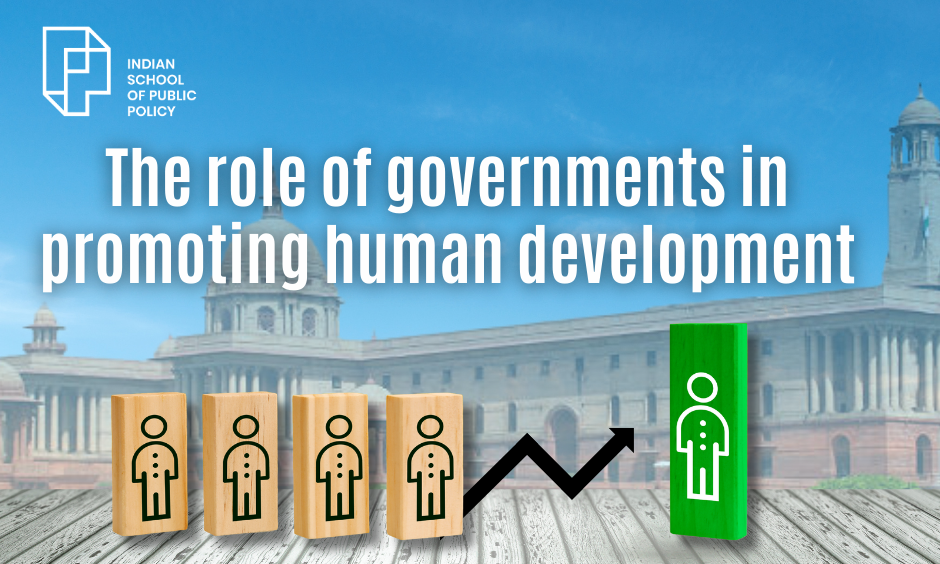
The role of governments in promoting human development

How governments drive human development through effective policymaking
Governments play a pivotal role in shaping the quality of life for their citizens. Human development, which focuses on enhancing individual well-being and expanding people’s freedoms, cannot thrive without the intervention of effective governance.
Now, effective governance is a cornerstone of human development, and at the heart of this governance lie qualified policymakers. Their expertise in various domains—including healthcare, education, and gender equality—ensures that policies are not only well-crafted but also effectively implemented. Understanding the significance of qualified policymakers in fostering human development is crucial to addressing the multifaceted challenges societies face today
 Example: Amartya Sen’s contributions to human development | Amartya Sen, a Nobel laureate in economics, revolutionised the field of human development through his work on welfare economics, poverty, and inequality. His “Capability Approach” redefined development, focusing on enhancing individuals’ abilities to lead fulfilling lives rather than purely economic growth. Sen’s influence on policy making is profound, especially in India, where his ideas shaped programmes like the National Rural Employment Guarantee Act (NREGA). His emphasis on inclusive development, poverty alleviation, and social justice made him a guiding figure for policymakers worldwide, advocating for policies that prioritise human well-being and equitable access to resources. |
What is the significance of qualified policymakers in the country?
In India, qualified policymakers are crucial for formulating effective policies, a few of which are mentioned below, that address the diverse needs of the population.
1. Healthcare policy development
Qualified policymakers with expertise in public health, healthcare financing, and epidemiology are essential in shaping comprehensive health systems that cater to all sections of society.
Example: The National Health Mission (NHM) is a prime example, aiming to provide accessible and affordable healthcare to rural and urban areas.

Policymakers who understand public health principles and epidemiology have designed initiatives such as the Ayushman Bharat scheme, which aims to provide health insurance to the underprivileged, thereby improving health outcomes across the country.
2. Education policy design
Education in India has seen transformative changes due to the efforts of qualified policymakers.
Example: The Right to Education Act (RTE) was implemented to provide free and compulsory education to children aged 6 to 14.

This act, backed by well-informed policymakers, aims to bridge the educational gap and ensure equitable access to education for all, especially marginalised communities. Furthermore, initiatives like the National Education Policy (NEP) 2020 reflect the need for education policymakers who are knowledgeable about contemporary educational practices and socio-economic factors.
3. Gender equality initiatives
The Indian government has made significant strides in promoting gender equality through various initiatives.
Example: Beti Bachao Beti Padhao (Save the Girl Child, Educate the Girl Child).

Qualified policymakers have played a key role in creating awareness and developing policies aimed at reducing gender discrimination and promoting women’s education. The representation of women in panchayati raj institutions, mandated by the 73rd and 74th Amendments to the Constitution has empowered women at the grassroots level and reflects the impact of informed policymaking on gender issues.
4. Economic policy implementation
India’s economic policies have evolved significantly over the years, thanks to the expertise of qualified policymakers.
Example: The implementation of the Goods and Services Tax (GST) is a notable example, simplifying the tax structure and promoting ease of doing business.

Economic policymakers with a solid understanding of fiscal policy and market dynamics were instrumental in the GST’s formulation, which aims to boost economic growth and increase compliance. Additionally, schemes like Make in India showcase how informed policymakers are promoting domestic manufacturing and attracting foreign investment.
The pathway to becoming a qualified policymaker
To become a qualified policymaker, individuals typically need to possess specific educational qualifications like a degree or certification from leading schools like the Indian School of Public Policy. Practical experience in government, non-profits, or international organisations is highly beneficial. Skills in critical thinking, analytical reasoning, and effective communication are also essential.
Key requirements:
- Educational background: A strong foundation in relevant academic disciplines.
- Practical experience: Internships or work experience in governmental or non-governmental organisations.
- Skill development: Proficiency in research, data analysis, and policy evaluation.
How can ISPP help aspiring policymakers?
For public policy aspirants passionate about making a tangible impact on society, formal education in this field is crucial. The Indian School of Public Policy (ISPP) offers a flagship Post Graduate Programme in Public Policy, Design & Management, which provides an in-depth understanding of policy formulation.
Through a curriculum that integrates classroom learning, skill-building, application, and leadership training, ISPP equips students with the tools to become effective policymakers and system thinkers.
Aspiring public policy professionals are encouraged to seek formal education from prestigious institutes like ISPP to gain the skills necessary to make a positive impact on society and the country.
Insights from Karuna Reang, an ISPP scholars
Apply now!!
Register your Interest to Study at ISPP
FAQS
What is the role of governments in human development?
Governments play a central role in human development by implementing policies that improve healthcare, education, economic equality, and social justice for all citizens.
Why is healthcare important for human development?
Healthcare ensures a healthy population, which is vital for economic productivity and overall well-being. Governments are responsible for making healthcare accessible to everyone.
How does education contribute to human development?
Education equips individuals with skills and knowledge, allowing them to improve their socio-economic conditions and contribute to societal growth.
What economic policies help reduce inequality?
Governments use progressive taxation, social security schemes, and minimum wage regulations to reduce economic inequality and support vulnerable populations.
Why is formal education important for public policy aspirants?
Formal education, such as ISPP’s Post Graduate Programme in Public Policy, provides aspiring policymakers with the skills and knowledge to craft impactful policies and improve governance systems.


